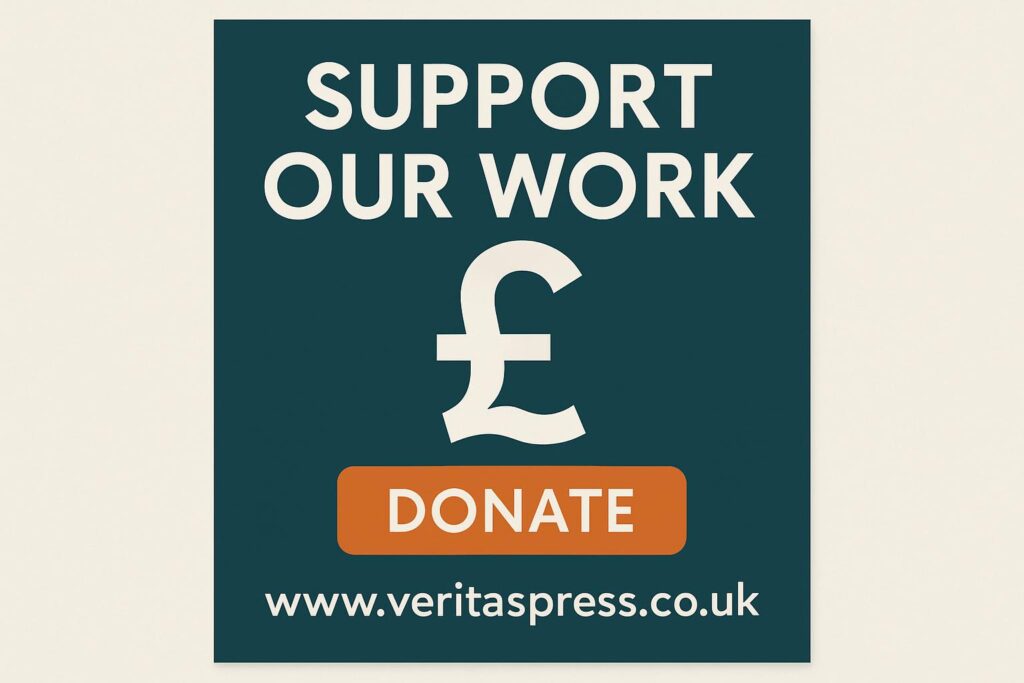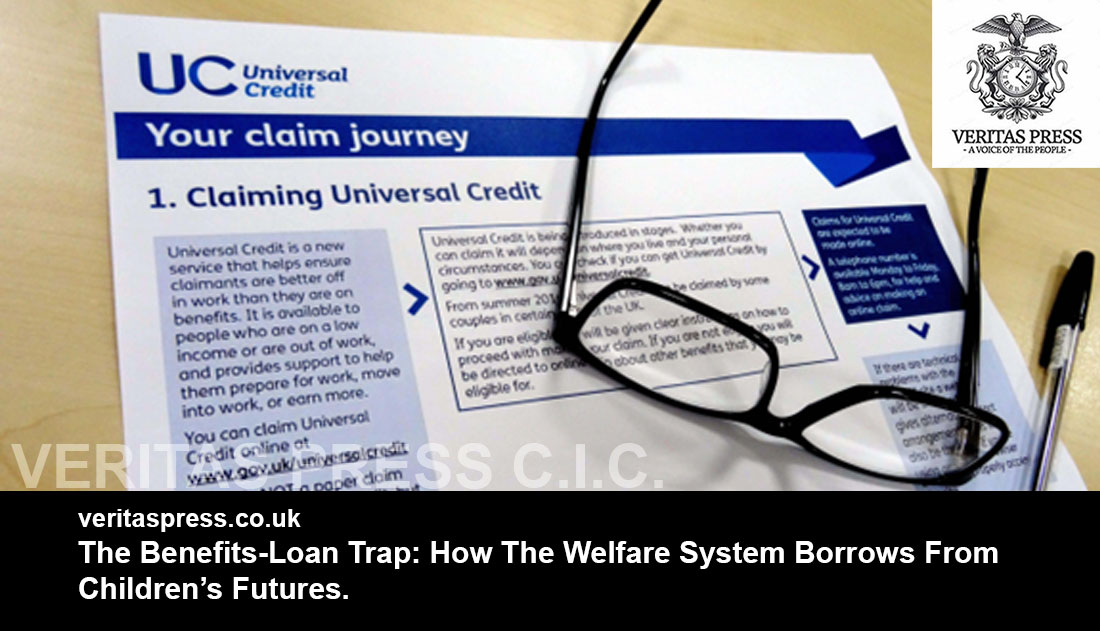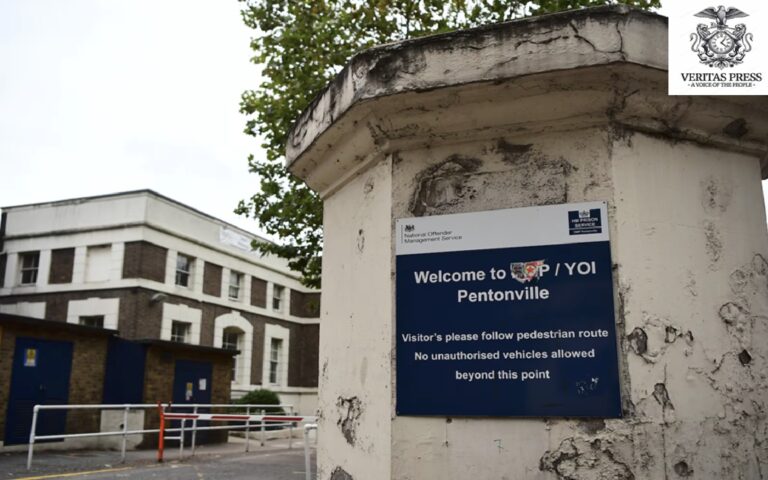Press Release: Veritas Press C.I.C.
Author: Kamran Faqir
Article Date Published: 09 Oct 2025 at 18:10 GMT
Category: UK | Politics | Benefits-Loan Trap
Source(s): Veritas Press C.I.C. | Multi News Agencies

Business Ads


The new figures obtained under Freedom of Information laws are stark: more than 800,000 Universal Credit-receiving households are currently having money taken from their monthly awards to repay advance payments, and over 500,000 children live in those households. Campaigners estimate the state reclaimed roughly £143 million in the last year through these clawbacks. Those are not abstract statistics; they are the ledger entries of a policy that systematically shifts the cost of administrative delay, and sometimes program design, onto the poorest families.
This piece goes beyond headline figures to interrogate why the debt cycle exists, who benefits, who loses, and what a genuinely humane fix would look like.
Designed Delay: Why The Five-Week Model Exists, And Why It Persists.
Universal Credit (UC) was structured to pay in arrears: claimants’ first ‘assessment period’ runs for weeks and then their first full monthly payment follows, a minimum wait of 35 days and, in practice, sometimes much longer. The DWP offers advance payments to bridge that gap, but they are loans later recovered from ongoing UC payments. The system, therefore, replaces an immediate cash safety-net with a deferred, repayable one.
That design is not a technical quirk: paying monthly in arrears reduces upfront fiscal outlay and simplifies administration for a centrally-managed system. But the distributional consequence is predictable and political: the delay turns a time-limited logistical decision into a structural transfer from low-income households to the state (in the form of lower future social payments). It is a regressive mechanism; the poorest families borrow (and repay) to access the support the system guarantees them.
The Human Ledger: What The Numbers Obscure.
Citizens Advice and frontline charities repeatedly report the lived outcomes: families skipping meals, rationing heating, accruing rent arrears, and resorting to high-cost credit to survive the wait that the state imposes. The Independent’s reporting of claimant testimonies, such as “Tina” from Kent, left with £3.75 while waiting for UC and now £240 in debt, is illustrative of how a single administrative design reproduces hardship. These are not rare anecdotes. Citizens Advice’s operational casework shows rising demand for help with deductions, and that a large proportion of clients are pushed into deficit budgets because of recoveries.
Two important points follow:
• Child poverty is debt-measured: When the state recovers advances from households with children, it effectively reduces child-focused spending in those homes. The figure of 500,000 children in households repaying advances should be read as a measurement of a policy that subtracts from children’s material security as a routine.
• Margins matter: Even when deductions are “small” (and recent policy caps have reduced the maximum), many households have zero buffer. A £50 monthly reduction can mean the difference between eating and not eating, or paying for gas and being plunged into prepayment meters and their higher costs.
Policy Tweaks Vs Structural Reform: What Recent Changes Have Been Achieved?
The government has recently capped deductions from the UC standard allowance at 15% (down from 25%), a reform presented as a relief to the worst-off and estimated to help around 1.2 million households. That cap represents a limited mitigation: it softens the blow but does not solve the underlying mechanism; the advances-as-loans model remains in force. The DWP frames advances as interest-free and targeted at urgent need, but the interest point masks the more significant harm: mandatory repayment.
Analysis of this nature must call out the political logic: a cap is politically easier and cheaper than converting advances to grants; it reduces headline harm while leaving the system’s extractive dynamic largely intact. In short: bandage, not cure.
The Economics Of Conversion: Grants Would Cost The Treasury, But Save Society.
Turning advances into non-repayable grants is the headline demand of charities and opposition MPs. That would create an immediate fiscal cost: the government would need to budget for one-off up-front payments rather than deferring recovery. But an honest cost-benefit accounting must include:
• Avoided social costs — reduced food-bank usage, fewer homelessness cases, lower NHS burdens from the costs of medicine, stress and food-insecurity related ill-health, and fewer referrals to debt relief services.
• Administrative savings — fewer error disputes, fewer recovery processes, and less enforcement activity.
• Long-term human capital — children not growing up in deeper poverty produce better educational and health outcomes; debt in childhood carries long-term costs.
The political choice is therefore not technical neutrality but a value judgment: is the marginal fiscal saving from loan recovery worth the predictable rise in human suffering and the knock-on costs to other public services? The balance sheet often tilts in favour of more generous, up-front support when the full social costs are counted, yet short electoral cycles and immediate budget constraints make such accounting politically awkward.
Accountability And Data Gaps:
The FOI disclosure and charity analyses fill a gap the DWP’s own public statistics do not fully illuminate: how many claimants choose advances. After all, they prefer a loan (e.g., to smooth cash flow), versus how many are driven to take them because they have no alternative. Public DWP statistics report timeliness of payments (e.g., the proportion receiving their first payment in full and on time) but do not break down the causal pathways into debt (e.g., how many would have been evicted or lost utilities without an advance). That lack of causal, micro-level transparency hampers rigorous policy choices.
We need better data collection: an anonymised administrative dataset linking advance offers, take-up, repayment schedules, household composition, subsequent arrears, and outcomes (homelessness, food-bank use, referrals to debt advice). This should be published for independent researchers.
Who Bears The Political And Moral Responsibility?
The DWP’s public line, advances are interest-free and available to those in urgent need, is technically true but politically deflective. It shifts the conversation from why the system requires advances to how they are administered. The moral frame should not be whether the loans are interest-bearing, but whether the state should require the poorest to take on repayable debt to access the benefits they are legally entitled to.
Opposition MPs and charities are pressing Chancellor Rachel Reeves to convert advances into grants in the Autumn Budget. That is a leverage point, but meaningful reform will require the Treasury and DWP to reckon with the fiscal implications and with the political economy that tolerates policies which make children bear the cost of system delays.
Potential Reforms: An Investigative Checklist For Policymakers.
Short-term (easy to implement)
- Convert all UC advances into non-repayable grants for new claims for at least 12 months while a proper system redesign is undertaken.
- Automatic, targeted interim payments (vouchers for essentials or direct transfers to energy accounts) for the most vulnerable at the claim point, removing the need for repayable advances.
- Lower or income-sensitive repayment caps so deductions reflect residual income, not a fixed proportion of standard allowance.
Medium-term (requires systems change)
- Reform UC to reduce assessment-to-payment time: restructure payment cycles to deliver a small initial guaranteed payment within days of claim.
- Create a hardship protocol that triggers non-recoverable support for at-risk claimants (pregnant women, families with children under 5, disabled households).
- Transparency mandate: publish anonymised, claimant-level recovery and outcome data to allow independent evaluation.
Longer-term (political & fiscal)
- Reassess the arrears model — is the monthly arrears payment the right default or a convenience for administration that costs more in social terms?
- End the political framing of welfare as a short-term cost to be minimised; rebuild it as a social investment with cross-departmental budgeting (DWP, Health, Education, Housing) that recognises preventative savings.
Legal And Moral Pressure Points:
Recent legal scrutiny and public pressure helped force the deduction cap, demonstrating that litigation and media exposure can win incremental reforms. But legal wins tend to narrow technical issues (unlawful procedures, discrimination) while leaving the overarching design untouched. A combined strategy of litigation, FOI-driven transparency, and vivid, humanised journalism (claimant case studies) is the most effective route to push for the systemic change donors and charities demand.
Conclusion: a policy choice, not a constraint
The benefits-loan trap is not an unfortunate side effect. It is the foreseeable consequence of how Universal Credit is structured and managed. The state can choose, politically and fiscally, whether the safety net will lift people up immediately or whether it will be paid for by borrowing from their futures.
The figures (800,000 households, 500,000 children, ~£143m reclaimed) are a moral ledger. If the Treasury and ministers truly prioritise child welfare and poverty reduction, the change required is straightforward: stop extracting repayments from households that the system has already failed to protect. If they refuse, the policy choice has already been made, and its consequences will be counted in the health, schooling and life-chances of children.
Advertisements
Tags:





























